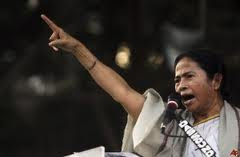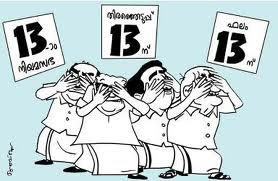Dhiru Mahadev started his career as an employee in one of the many British companies located in the coast of Aden. Although a humble beginning, Dhiru was always poised for bigger challenges in life. A few years into his career he met the two people who would become his working partners in future.
The first person was Brahm Dev, a man of impeccable knowledge and research experience. His intelligence was supreme and people felt he thought with not one brain, but four! The other was Vishnu Baba, an operations expert who knew to keep any plant running irrespective of any form of trouble, be it from employees or management.
So when they formed their venture ‘Hind Reliance’, Brahm took charge of R&D and was responsible for creativity and innovation, while Vishnu took charge of operations and plant management. Mr.Mahadev, being the biggest contributor in the venture, was responsible for final goods delivery and overall decision making. So he was nicked ‘Param’- meaning supreme.
Param meanwhile got married to Parvatiben, a good looking woman with a strong Gujrati background.The couple were blessed with two sons. The elder one was Ganesh Mahadev and the younger was Karthik Mahadev.
Ganesh was born with a speech disability. He was smart but would not talk. This made him very shy and tied down to his own world of books and stories. Very soon his friends started calling him Mook-esh (‘mook’ meaning dumb in Hindi). Karthik on the other hand was a very handsome extrovert. He was inclined to movies and show biz right from a young age. At one point he felt that his name Karthik was so not reflective of his ‘modern’ nature that he re-christened himself ‘Anil’ after his favourite star in Bollywood Anil Kapoor.
As years went by, Dhiru Mahadev’s company became big and it looked like its employees could form a nation of their own. Dhiru would often quip to his wife, “Sitting in the twenty fifth floor of my office in Nariman Point, I feel like I am on top of some Kailash mountain and can see the entire world from a bird’s eye view.”
Mookesh and Anil went to the best school in the country and after completing their schooling in India, they were sent away for graduating in business studies from the US. When it was time for his sons to return after completing their graduate studies, Param found that he was a deeply worried and concerned man. He feared that bookish education in the US would be a handicap for his sons to run Hind Reliance. He feared that their decision making abilities will be affected by their Americanised perspectives in business, especially in a completely Indian company like theirs.
So he decided to test them.
One day after they were back in India, Param called his wife Parvatiben and their sons Mookesh and Anil to his study. There he was sitting with his close friend Mr.Narad Muni. Narad was a shrewd businessman who spent most of his life travelling across seas and shores for running his business. When they were ready, Param spoke.
“Sons, you are both very adorable, and we love you both. You have completed your education and have made yourselves eligible for bigger roles now. However, I would like to test you to know who among you is better suited at following me.”
“I have transferred Rs.1,00,00,000 to both your accounts. Now I will give you a maximum of one month to complete this assignment. Go and experience life to the fullest! Narad uncle will help you get your air tickets and all ready.”
True to their respective selves Mookesh remained sombre and unperturbed while there was a distinctive glint in Anil’s eyes. Within two days, Anil was cruising through the waters of Nile, while his elder brother Mookesh was slump on the couch watching Mind Your Language series on television.
Anil booked a Europe tour package that took him to the most exotic of places in the Europe. He cruised on the seas, went bungee jumping, yachting, rowing, and ice skiing and trekking through the Alps. He drank the most expensive liquors and slept with the most exquisite women from across the globe. He drove in the most luxurious of vehicles and interacted with many celebrities worldwide.
Meanwhile, his brother Mookesh preferred to stay indoors than outdoors. Much to the surprise of everyone around him, he went and joined Hind Reliance to help his father in business. In a matter of one week, he learnt the business in and out. By three weeks, he made Hind Reliance a profit of Rs. 50,00,000. Impressed by his effort at running the company, Param declared Mookesh as his successor.
When Anil came back from his tour, he was aghast to see that Mookesh had already been proclaimed winner in a contest that he considered uncompleted. Red faced, with a heavy heart he spoke to his father.
“Dad, you asked us to ‘GO’ and enjoy life. So I went out and experienced the best of everything in the world and came back. I learnt the best practices from everywhere and hoped to implement them in our company. But here I see that in spite of having not stepped outside the city, you have proclaimed Mookesh to be the winner. How unfair is that father?”
Param replied, “Yes, I asked you to experience ‘life’. By joining me at the company, Mookesh proved that ‘Hind Reliance’ was his life. What could have been a better reason to announce him as my successor?”
Not convinced at his father’s judgement Karthik ‘Anil’ Mahadev cried foul, vowed to never join his father’s company and walked out of the Mahadev family house.
Dhiru ‘Param’ Mahadev smiled. His wife Parvatiben cried. Their son Ganesh ‘Mookesh’ Mahadev looked expressionless, but his dreams sore high like a 60 floors tower worth US$2Bn in the heart of Mumbai city!
-Shyam










